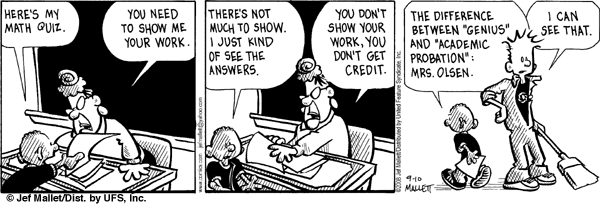Three years ago I read and reviewed Lu Hanessian's Let the Baby Drive, and recently my thoughts have been returning to that insightful book. Today's Frazz brought it again to mind.
 (More)
(More)
Faith is three days old and mother and daughter are doing great. Heather is healing rapidly, faster than with any of her other births. Faith is a champion nurser. Eating, sleeping, and looking adorable are her primary activities, but she also likes to look around and has quite decent head control for a three-day-old.
A nurse came to visit (part of the package with the Midwife Center) and seemed happy with everything. She did a heel stick on Faith for the PKU and other testing, and as soon as she did, Jonathan and Noah jumped and stood by their sister like knights—they weren't allowed to fight off the nurse, however. The main problem was not the heel stick itself, but trying to get enough blood for the tests required a lot of heel manipulation and squeezing, and Faith's cry was clearly more from anger than from pain.
Dad-o had to fly back to Phoenix, but Grammy and Papa popped in from New Hampshire, thrilling the two boys and soaking up as much "holding time" with Faith as possible given that their visit was actually shorter than the driving time.
Church people have been generous with meals and if they keep up this rate and quantity very long, Heather and Jon will have meals for six months. :)
Sunday night was a difficult one, but last night went better. We're all a bit sleep-deprived, but it's not entirely Faith's fault. I, for example, went to bed early tonight then stayed up to write this post.
Permalink | Read 2317 times | Comments (0)
Category Everyday Life: [first] [previous] [next] [newest]
Permalink | Read 2207 times | Comments (0)
Category Random Musings: [first] [previous] [next] [newest]
Click on a picture to see more.
Early and middle labor: Heather's still smiling, and the men are assembling a wheelbarrow.
Proud big brothers and daddy
Happy aunt, happy mother at home
Faith Elizabeth Daley!
Permalink | Read 5067 times | Comments (3)
Category Everyday Life: [first] [previous] [next] [newest]
On Saturday, September 6, 2008, at 6:35 p.m., Heather delivered a beautiful baby girl! She weighs 9 lbs. 3.5 oz. and is 20.75 in. long. That may sound like a big baby, but she's a pound lighter than big brother Noah at birth.
The name of the newest member of our family, the first girl in over 26 years, is
Faith Elizabeth Daley
Everyone is very happy and doing well. As time permits, I'll publish a longer version of the story, and you can follow it from a more direct perspective on Heather and Jon's blog.Permalink | Read 4663 times | Comments (0)
Category Everyday Life: [first] [previous] [next] [newest]
Permalink | Read 1693 times | Comments (0)
Category Random Musings: [first] [previous] [next] [newest]
Jon: If you had to pick, would you rather have a live mouse or a dead mouse in your house?
Heather: A dead mouse.
Jon: Then I have good news for you!Permalink | Read 2195 times | Comments (0)
Category Everyday Life: [first] [previous] [next] [newest]
I'm tired and have too much to do. Therefore, I'm procrastinating. I'm putting our guesses about Little Baby Daley's arrival here where it's easy to update as they come in.
JW: September 1, 11:00 p.m., girl, 8 lbs. 5 oz.
DL: September 2, boy, 10 lbs. 2 oz., 22 in.
JMD: September 3, 3:00 p.m., 9 lbs. 15 oz, 21.5 inches.
PW: September 4, 3:00 a.m., girl, 7lbs. 12oz.SS: September 4, 19:56, boy, 4210 grams, 51 cm (7:56 p.m., 9 lbs. 4.5 oz., 20 in.)
LW: September 5, girl, 8 lbs. 8 oz.
HD: September 6, 6:00 a.m., 9lbs. 8 oz.
SL: September 6, 9:06 p.m., boy, 9 lbs. 6 oz.
NA: September 9, boy, 9 lbs. 9 oz.
More to come.Permalink | Read 2534 times | Comments (6)
Category Everyday Life: [first] [previous] [next] [newest]
No time for something more thoughtful at the moment, but I saw this and can't resist passing it on. Check out this genetic map of Europe, and read the New York Times article that goes with it.

...and as far as I'm concerned, Hurricane Season can end right here. Tropical Storm Fay's path is looking suspiciously like that of Hurricane Charley, and most of us would just as soon not relive that part of 2004.
Thanks for your prayers.Permalink | Read 2554 times | Comments (15)
Category Hurricanes and Such: [first] [previous] [next] [newest]
Years ago, when a friend recommended Airborne for staving off colds, I was skeptical, as I always am with such claims. But after reading the ingredients and deciding they wouldn't hurt me (and I'm past the age of worrying that what I ingest will hurt someone else), I tried it. And it worked. Repeatedly. The number and the severity of my upper respiratory tract infections were drastically reduced, even though I was travelling and visiting young children, two definite risk factors. One year I had none at all. Zero. At the time, I exclaimed to all who would hear, "Maybe it really works, or maybe it's just the Placebo Effect. I don't care. I'm quite willing to pay a dollar a tablet for something that 'doesn't work' but so obviously improves my health."
The Federal Trade Commission disagrees, claiming there is no evidence for the efficacy of Airborne's products, and requiring the company to issue refunds for the price of up to six packages to those who request them. That won't include me. Not only am I not certain that $30 would be worth the paperwork involved, but more importantly, I don't see how I could in good conscience ask for a refund when the product worked.
Even Steven Gardner, director of litigation for the Center for Science in the Public Interest, which was part of a class-action lawsuit against Airborne, admitted, ""It is pretty much impossible to prove that it didn't prevent a cold if you don't get a cold." And that's the point. Doctors, lawyers, and the government can worry about advertising claims and scientific proof of efficacy, but my concerns have a narrower focus: if I don't get a cold, that's good enough for me.
Speaking of the Placebo Effect, here's an interesting story on how it relates to exercise and fitness.Okay, I'm being really lazy today and merely posting a link to someone else's post, but there are too many other things to attend to, and John C. Wright has another good one: Albino Jesuit Assassins ... IN SPAAACE! I mean, really...with a title like that....
Anyway, enjoy! I have to get on with life.Permalink | Read 2421 times | Comments (0)
Category Random Musings: [first] [previous] [next] [newest]
When an article from my "to blog" backlog, a recent post from one of my blogging contacts, and an article from the most recent issue of a magazine I respect all converge, I can take that as a good suggestion for today's post.
Jennifer Fulwiler writes the Conversion Diary blog (formerly "Et Tu?"), which I've featured before (here, among other places). This is her article in America. John C. Wright is a science fiction writer. It was his blog post that alerted me to the First Things article. Read his introduction, but don't settle for his summary of the article. Instead, read Mary Eberstadt's The Vindication of "Humanae Vitae" yourself. (More)Whatever you think about John Edwards, he isn't stupid, and choosing to admit his adulterous affair while our attention was focused on the Olympic opening ceremonies was probably a smart move.
Russia isn't stupid, either. They couldn't hope to invade another country without generating some controversy, but doing so while the eyes of much of the world and even more of the news media are on events in Beijing gives them a good chance of being ignored, at least long enough to accomplish their purposes. (More)









